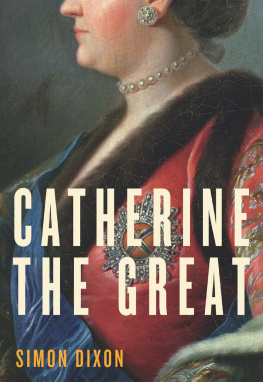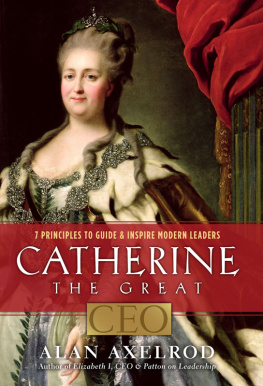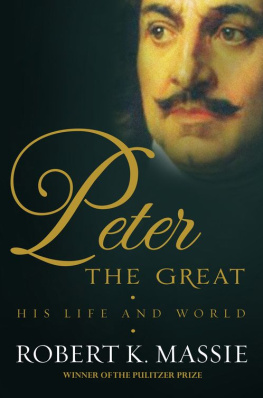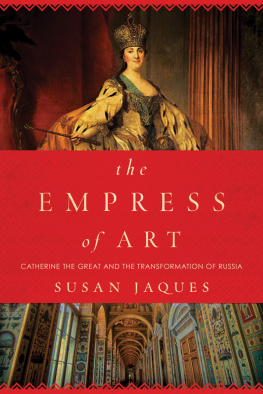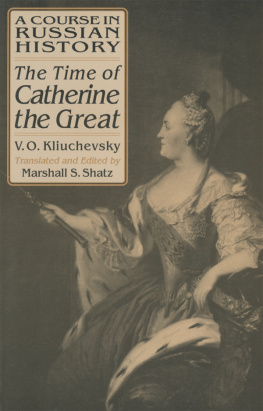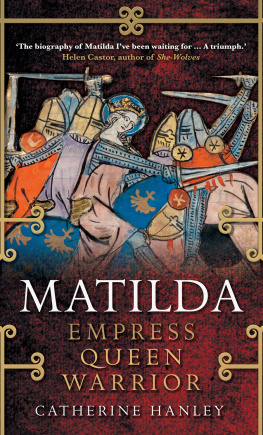PREFACE.
Table of Contents
SOME hours after the death of the Empress Catherine, her son, the Emperor Paul, ordered Count Rostoptchine to put the seals upon her papers. He was himself present at the arrangement of these papers. Among them was found the celebrated letter of Alexis Orloff, in which, in a cynical tone and with a drunken hand, he announced to the Empress the assassination of her husband Peter III. There was also a manuscript, written entirely by the hand of Catherine herself, and enclosed in a sealed envelope, bearing this inscription:To his Imperial Highness, the Cesarewitch and Grand Duke Paul, my beloved son. Under this envelope was the manuscript of the Memoirs which we now publish.
The manuscript terminates abruptly towards the close of the year 1759. It is said that there were with it some detached notes, which would have served as materials for its continuation. Some persons affirm that Paul threw these into the fire; but nothing certain is known upon this point. Paul kept his mothers manuscript a great secret, and never entrusted it to any one but the friend of his childhood Prince Alexander Kourakine. The Prince took a copy of it. Some twenty years after the death of Paul, Alexander Tourgeneff and Prince Michael Worontzoff obtained copies from the transcript of Kourakine. The Emperor Nicholas having heard of this, gave orders to the Secret Police to seize all the copies. Amongst them was one written at Odessa, by the hand of the celebrated poet Pouschkine. A complete stop was now put to the further circulation of the Memoirs.
The Emperor Nicholas had the original brought to him by the Count D. Bloudoff, read it, sealed it with the great seal of state, and ordered it to be kept in the imperial archives, among the most secret documents.
To these details, which I extract from a notice communicated to me, I ought to add that the first person who spoke to me on the subject was Constantine Arsenieff, the preceptor of the present Emperor. He told me, in 1840, that he had obtained permission to read many secret documents relative to the events which followed the death of Peter I, up to the reign of Alexander I. Among these documents, he was authorized to read the Memoirs of Catherine II. (At that time he was teaching the Modern History of Russia to the Grand Duke, the heir presumptive.)
During the Crimean war, the archives were transferred to Moscow. In the month of March, 1855, the present Emperor had the manuscript brought to him to read. Since that period one or two copies have again circulated at Moscow and St. Petersburg. It is from one of these that we now publish the Memoirs. As to their authenticity, there is not the least room for doubt. Besides, it is only necessary to read two or three pages of the text to be quite satisfied on the point.
We have abstained from all corrections of the style, in every case in which it was not evident that the copy presented some fault of transcription.
Passing to the Memoirs themselves, what do we find?
The early years of Catherine IIof that woman-Emperor, who occupied for more than a quarter of a century all contemporary minds, from Voltaire and Frederic II to the Khan of the Crimea and the Chiefs of the Kirghisher young days described by herself! ... What is there for the Editor to add to this?
In reading these pages, we behold her entering on the scene, we see her forming herself to that which she afterwards became. A frolicsome girl of fourteen, her head dressed la Mose, fair, playful, betrothed of a little idiot, the Grand Duke, she has already caught the disease of the Winter Palacethe thirst of dominion. One day, while perched with the Grand Duke upon a window-sill, and joking with him, she saw Count Lestocq enter: Pack up your things, he said, you are off for Germany. The young idiot seemed but little affected by the threatened separation. It was pretty nearly a matter of indifference to me also, says the little German girl; but the Crown of Russia was not so, adds the Grand Duchess.
Here we have, in the bud, the Catherine of 1762!
To dream of the crown, however, was quite natural in the atmosphere of that court; natural not only for the betrothed of the Heir Presumptive, but for every one. The groom Biren, the singer Rasoumowsky, the Prince Dolgorouky, the plebeian Menchikoff, the oligarch Volynskievery one was anxious for a shred of the imperial mantle. The crown of Russia, after Peter I, was a res nullius.
Peter I, a terrorist and reformer, before all things, had no respect for legitimacy. His absolutism sought to reach even beyond the tomb. He gave himself the right of appointing his successor, and instead of appointing him, he contented himself with ordering the assassination of his own son.
After the death of Peter, the nobles assembled for deliberation. Menchikoff put a stop to all discussion, and proclaimed as empress his old mistress, the widow of a brave Swedish dragoon, slain upon the field of battle, the widow of Peter also, to whom Menchikoff had resigned her through devotion to his master.
The reign of Catherine I was short. After her the crown passed from head to head as chance directed: from the once Livonian tavern-keeper, to a street-boy (Peter II); from this street-boy who died of small-pox, to the Duchess of Courland (Anne); from the Duchess of Courland to a Princess of Mecklenburg (wife of a Prince of Brunswick), who reigned in the name of an infant in the cradle (Ivan); from this boy, born too late to reign, the crown passed to the head of a woman born too soonElizabeth. She it is who represents legitimacy.
Tradition broken, the people and the state completely separated by the reforms of Peter I, coups dtat and palace revolutions were the order of the day; nothing was fixed. The inhabitants of St. Petersburg, when retiring at night, knew not under whose government they should awake in the morning; they consequently took but little interest in changes, which, after all, did not essentially concern any but a few German intriguers, become Russian ministers, a few great nobles grown gray in perjury and crime, and the regiment of Preobrajensky, which disposed of the crown like the Pretorians of old. For all others, everything remained unchanged. And when I say others, I speak only of the nobles and officials; for as to the great silent peoplethat people prostrate, sad, stupefied, dumbit was never thought of. The people was beyond the pale of the law, and passively accepted the terrible trial which God had sent it, caring little for the spectres which mounted with tottering steps the ascent to the throne; gliding like shadows, and disappearing in Siberia, or in the dungeons. The people was sure to be pillaged in any case. Its social condition therefore was beyond the reach of accident.
What a strange period! The imperial throne, as we have elsewhere said, was like the bed of Cleopatra. A crowd of oligarchs, of strangers, of panders, of minions, led forth nightly an unknown, a child, a German; placed the puppet on the throne, worshipped it, and, in its name, gave the knout to all who presumed to question the arrangement. Scarcely had the chosen one time to become intoxicated with the delights of an exorbitant and absurd power, and to condemn his enemies to slavery or torture, when the succeeding wave raised up another pretender, and the chosen of yesterday, with all his followers, was ingulphed in the abyss. The ministers and generals of one day, were the next on their way to Siberia, loaded with chains.




